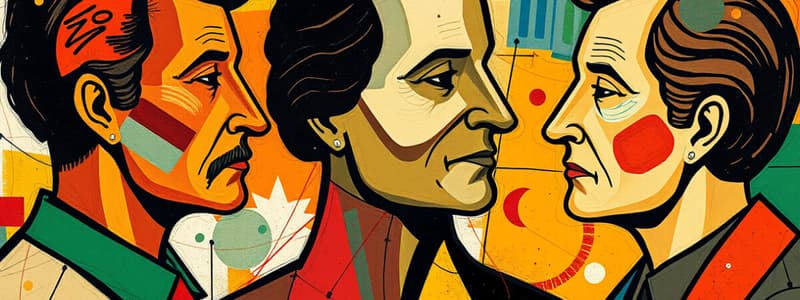Podcast
Questions and Answers
Which key area of political science focuses on the relationships between nations?
Which key area of political science focuses on the relationships between nations?
- Comparative Politics
- Political Theory
- International Relations (correct)
- Public Administration
Microeconomics examines economy-wide phenomena such as inflation and unemployment.
Microeconomics examines economy-wide phenomena such as inflation and unemployment.
False (B)
What is the process through which individuals learn and internalize values and norms?
What is the process through which individuals learn and internalize values and norms?
Socialization
The study of past events, societies, and civilizations is known as ________.
The study of past events, societies, and civilizations is known as ________.
Match the following branches of economics with their focus:
Match the following branches of economics with their focus:
Which of the following best describes 'social structure' in sociology?
Which of the following best describes 'social structure' in sociology?
Causation in history seeks to understand why specific events happened.
Causation in history seeks to understand why specific events happened.
What is the study of how social hierarchies and inequalities are examined?
What is the study of how social hierarchies and inequalities are examined?
Political science explores ideas about governance, justice, liberty, and ________.
Political science explores ideas about governance, justice, liberty, and ________.
Which of the following is an example of a key theme in history?
Which of the following is an example of a key theme in history?
Flashcards are hidden until you start studying
Study Notes
Social Science
Political Science
- Definition: Study of government systems, political behavior, and political structures.
- Key Areas:
- Political Theory: Explores ideas about governance, justice, liberty, and rights.
- Comparative Politics: Compares political systems and practices across different countries.
- International Relations: Focuses on relationships between nations and global issues.
- Public Administration: Examines the implementation of government policy and public sector management.
Sociology
- Definition: Study of society, social relationships, and social institutions.
- Key Concepts:
- Social Structure: The organized pattern of social relationships and institutions.
- Socialization: The process through which individuals learn and internalize values and norms.
- Culture: The beliefs, behaviors, and artifacts of a group, shaping social identity.
- Class and Stratification: Examination of social hierarchies and inequalities.
Economics
- Definition: Study of production, distribution, and consumption of goods and services.
- Branches:
- Microeconomics: Focuses on individual and business behavior in decision-making.
- Macroeconomics: Looks at economy-wide phenomena, including inflation, unemployment, and GDP.
- Behavioral Economics: Analyzes the effects of psychological factors on economic decision-making.
- Development Economics: Studies economic development and poverty alleviation strategies.
History
- Definition: The study of past events, societies, and civilizations.
- Key Themes:
- Chronology: Understanding events in a timeline context.
- Causation: Investigating the reasons behind historical events.
- Cultural History: Examines how culture influences historical events and vice versa.
- Historiography: The study of how history is written and the methods historians use.
Interconnections
- Political Science and Sociology: Analyze how social structures influence political systems.
- Economics and History: Historical economic events shape contemporary economic theories.
- Sociology and Economics: Investigate social factors affecting economic behavior and outcomes.
Importance of Social Science
- Provides insights into human behavior and societal trends.
- Helps in policymaking and understanding global issues.
- Promotes critical thinking through analysis of complex social phenomena.
Political Science
- Study of government systems, political behavior, and political structures.
- Key Areas include:
- Political Theory: Examines concepts of governance, justice, liberty, and rights.
- Comparative Politics: Evaluates political systems and practices across various countries.
- International Relations: Analyzes interactions between nations and global challenges.
- Public Administration: Focuses on execution of government policies and management in the public sector.
Sociology
- Study of society, social relationships, and social institutions.
- Key Concepts include:
- Social Structure: Organized patterns of social relationships and institutions.
- Socialization: Process by which individuals learn and adopt societal values and norms.
- Culture: Encompasses the beliefs, behaviors, and artifacts shaping group identities.
- Class and Stratification: Investigates social hierarchies, inequalities, and their impacts.
Economics
- Study of production, distribution, and consumption of goods and services.
- Branches include:
- Microeconomics: Analyzes individual and business decision-making behaviors.
- Macroeconomics: Investigates economy-wide phenomena, including inflation and GDP.
- Behavioral Economics: Studies psychological factors influencing economic choices.
- Development Economics: Focuses on economic development and strategies for poverty alleviation.
History
- The study of past events, societies, and civilizations.
- Key Themes include:
- Chronology: Contextualizes events within a timeline framework.
- Causation: Explores the underlying reasons for significant historical events.
- Cultural History: Investigates the interplay between culture and historical developments.
- Historiography: Analyzes the methodology and writing processes of historians.
Interconnections
- Political Science and Sociology: Examines the influence of social structures on political frameworks.
- Economics and History: Connects historical economic events to their impact on modern economic theories.
- Sociology and Economics: Studies how social factors influence economic behaviors and results.
Importance of Social Science
- Offers insights into human behavior and societal dynamics.
- Aids in policymaking and understanding complex global issues.
- Encourages critical thinking by analyzing intricate social phenomena.
Studying That Suits You
Use AI to generate personalized quizzes and flashcards to suit your learning preferences.




